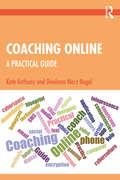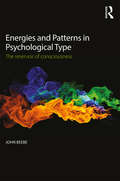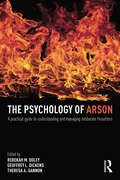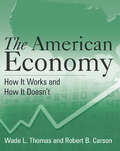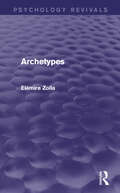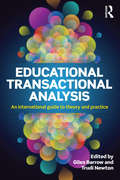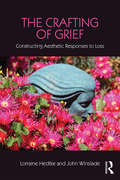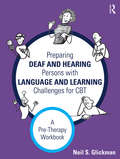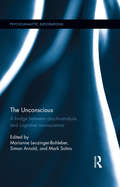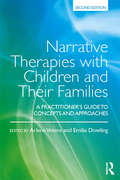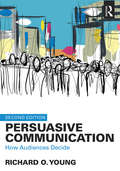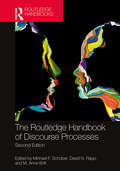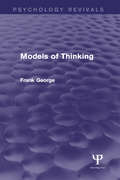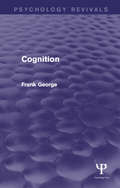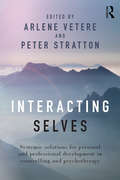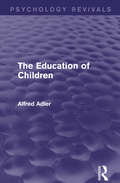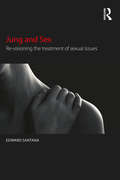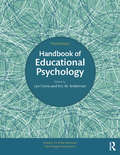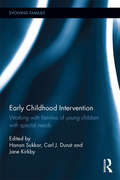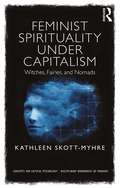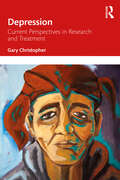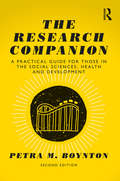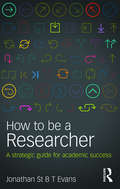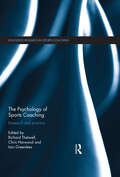- Table View
- List View
Coaching Online: A Practical Guide
by Kate Anthony DeeAnna Merz NagelTranslating traditional coaching methods and competencies for use in the online world, this informative and timely guide shows coaches how to transform their face-to-face practice into one that utilises technological means of communication with clients, mentors, and everyone else associated with their practice. The book offers up-to-the-minute practical and ethical information from two world-expert coaches, leaning on their combined 50 years of experience and study. It covers the practice of online coaching via email, chat, audio/telephone and video methods, as well as the ethics of online coaching (including an ethical framework), case material, supervision, mentoring and training, and a look into the future of the coaching profession in light of technological developments and the culture of cyberspace. Whether you are a coach-in-training or established Coaching Master, this book is an accessible and invaluable tool for taking and maintaining your coaching services online.
Energies and Patterns in Psychological Type: The reservoir of consciousness
by John BeebeThis book encapsulates John Beebe's influential work on the analytical psychology of consciousness. Building on C. G. Jung's theory of psychological types and on subsequent clarifications by Marie-Louise von Franz and Isabel Briggs Myers, Beebe demonstrates the bond between the eight types of consciousness Jung named and the archetypal complexes that impart energy and purpose to our emotions, fantasies, and dreams. For this collection, Beebe has revised and updated his most influential and significant previously published papers and has introduced, in a brand new chapter, a surprising theory of type and culture. Beebe's model enables readers to take what they already know about psychological types and apply it to depth psychology. The insights contained in the fifteen chapters of this book will be especially valuable for Jungian psychotherapists, post-Jungian academics and scholars, psychological type practitioners, and type enthusiasts.
The Psychology of Arson: A Practical Guide to Understanding and Managing Deliberate Firesetters
by Rebekah Doley Geoffrey Dickens Theresa GannonThe Psychology of Arson is the first book in its field to focus specifically on contemporary topics relevant to practitioners and professionals working with adolescent and adult deliberate firesetters. Rebekah Doley, Geoffrey Dickens and Theresa Gannon have integrated the very latest information regarding prevalence, theory, research and practice in one accessible resource, and provide practical advice, strategies and techniques in a context of evidence-based research which will be invaluable for all treatment providers who work in the field of deliberate fire setting. Unique features of this book include chapters considering community awareness, strategies, survivors of arson, filicide and suicide by fire, as well as a new treatment model developed on the basis of the latest research in the field. It is divided into four parts: Theories and typologies of firesetting Legal, investigative and preventative issues Assessment and risk assessment of deliberate firesetters Treatment, needs and management of deliberate firesetters The Psychology of Arson provides the first scientist-practitioner model for the treatment of arson offenders. It will be an essential resource for forensic psychiatrists, clinical psychologists and other professionals working with this client group.
The American Economy: A Student Study Guide
by Robert B. Carson Wade L. ThomasA student study guide to accompany the principle work, 'The American economy: how it works and how it doesn't'.
Archetypes (Psychology Revivals)
by Elémire ZollaMan is dominated by his archetypes; they mould not only his history but his dreams. But how are we to define and evaluate them? Is it perhaps possible for us to relate more creatively to them? Originally published in 1981, these are some of the questions raised by this title. To answer them the author gathered together a vast amount of material drawn from Eastern and Western traditions, from science, literature, art and poetry. The answers he puts forward are often highly original and will surely challenge many of our most cherished patterns of thought. There emerges from this book what can only be described as a global metaphysical system, yet the author’s language is not that of an ordinary metaphysical treatise, and what he writes offered new challenge and hope to those suffering from the despair and cynicism engendered by a great deal in modern society at the time. Zolla does not, however, advocate a return to earlier historical patterns, nor is he proposing a new Utopia, but rather offers us a brilliant series of lessons in the art of centring. In the words of Bernard Wall, writing in the Times Literary Supplement, Zolla’s ‘deep, polymathic probing of the terms of human existence makes it sensible to compare him with Simone Weil, while some of his conclusions about ultimate mysteries – expressed in signs, symbols and sacraments, the sense of which we have lost – will make us think of the later T. S. Eliot’.
Educational Transactional Analysis: An international guide to theory and practice
by Giles Barrow Trudi NewtonWhile there are a small number of titles exploring Transactional Analysis in specific educational settings, there is no comprehensive account of this practical psychology for learning. Educational Transactional Analysis draws together a team of contributors from the international educational TA community, offering perspectives from Europe, India, South Africa, Australia, Japan and the United States to explain and illustrate the practice of this exciting development in education. Establishing a seminal overview that will make it the ‘go to’ text, the book covers four key sections: Philosophy, Politics, Principles & Educational Transactional Analysis The Identity of the Teacher Educational Transactional Analysis and Schooling Educational Transactional Analysis: Adult learning and community development Aimed at educators in all contexts, researchers, students and trainers, this book will be an essential resource for those that wish to deepen their understanding of educational TA or are involved in formal TA training.
The Crafting of Grief: Constructing Aesthetic Responses to Loss (Series in Death, Dying, and Bereavement)
by John Winslade Lorraine HedtkeMany books on grief lay out a model to be followed, either for bereaved persons to live through or for professionals to practice, and usually follow some familiar prescriptions for what people should do to reach an accommodation with loss. The Crafting of Grief is different: it focuses on conversations that help people chart their own path through grief. Authors Hedtke and Winslade argue convincingly that therapists and counselors can support people more by helping them craft their own responses to bereavement rather than trying to squeeze experiences into a model. In the pages of this book, readers will learn how to develop lines of inquiry based on the concept of continuing bonds, and they’ll discover ways to use these ideas to help the bereaved craft stories that remember loved ones’ lives.
Bereavement Groups and the Role of Social Support: Integrating Theory, Research, and Practice
by William G. HoyAll too frequently, clinical practice consists of repeating year after year the methods learned in graduate training, occasionally seasoned by a technique learned in a continuing-education workshop. Bereavement Groups and the Role of Social Support gives clinicians what they’ve been missing in other volumes: practical techniques that have a solid contemporary empirical basis. Deftly weaving together theory, research, and practice, this volume is a compendium of the latest practical thinking about bereavement support groups. Readers will learn when well-loved practices make sense and are supported by sound evidence, as well as which practices should possibly be discontinued. The book also contains the results of a qualitative study bringing together the best practices of experienced bereavement group leaders from around the world.
Preparing Deaf and Hearing Persons with Language and Learning Challenges for CBT: A Pre-Therapy Workbook
by Neil S. GlickmanPreparing Deaf and Hearing Persons with Language and Learning Challenges for CBT: A Pre-Therapy Workbook presents 12 lessons to guide staff in hospital and community mental health and rehabilitation programs on creating skill-oriented therapy settings when working with people who don’t read well or have trouble with abstract ideas, problem solving, reasoning, attention, and learning. Drawing from the worlds of CBT, current understandings of best practices in psychotherapy, and the emerging clinical specialty of Deaf mental health care, the workbook describes methods for engaging people who are often considered poor candidates for psychotherapy.
The Unconscious: A bridge between psychoanalysis and cognitive neuroscience (Psychoanalytic Explorations)
by Marianne Leuzinger-Bohleber Simon Arnold Mark SolmsThe Unconscious explores the critical interdisciplinary dialogue between psychoanalysis and contemporary cognitive neuroscience. Characterised by Freud as ‘the science of the unconscious mind’, psychoanalysis has traditionally been viewed as a solely psychological discipline. However recent developments in neuroscience, such as the use of neuroimaging techniques to investigate the working brain, have stimulated and intensified the dialogue between psychoanalysis and these related mental sciences. This book explores the relevance of these discussions for our understanding of unconscious mental processes. Chapters present clinical case studies of unconscious dynamics, alongside theoretical and scientific papers in key areas of current debate and development. These include discussions of the differences between conceptualisations of ‘the unconscious’ in psychoanalysis and cognitive science, whether the core concepts of psychoanalysis are still plausible in light of recent findings, and how such understandings of the unconscious are still relevant to treating patients in psychotherapy today. These questions are explored by leading interdisciplinary researchers as well as practising psychoanalysts and psychotherapists. This book aims to bridge the gap between psychoanalysis and cognitive neuroscience, to enable a better understanding of researchers’ and clinicians’ engagements with the key topic of the unconscious. It will be of key interest to researchers, academics and postgraduate students in the fields of psychoanalysis, cognitive science, neuroscience and traumatology. It will also appeal to practising psychoanalysts, psychotherapists and clinicians.
Narrative Therapies with Children and Their Families: A Practitioner's Guide to Concepts and Approaches
by Arlene Vetere Emilia DowlingNarrative Therapies with Children and their Families introduces and develops the principles of narrative approaches to systemic therapeutic work, and shows how they can provide a powerful framework for engaging troubled children and their families. Written by eminent and leading clinicians, known nationally and internationally for their research and theory development in the field of child and family mental health, the book covers a broad range of difficult and sensitive topics, including trauma, abuse and youth offending. It illustrates the wide application of these principles in the context of the particular issues and challenges presented when working with children and families. Since publication of the first edition, the importance of narrative therapy has continued to grow, and this new edition provides an updated and revised overview of the field, along with three new chapters to keep apace with developments in child mental health trauma work. This book remains a key text in the field of systemic narrative training and practice. With clinical examples throughout, this practical book will be welcomed by family and systemic therapists and other professionals in the field of child, adolescent and family mental health.
Persuasive Communication: How Audiences Decide
by Richard O. YoungThis updated and expanded edition of Persuasive Communication offers a comprehensive introduction to persuasion and real-world decision making. Drawing on empirical research from social psychology, neuroscience, business communication research, cognitive science, and behavioral economics, Young reveals the thought processes of many different audiences—from investors to CEOs—to help students better understand why audiences make the decisions they make and how to influence them. The book covers a broad range of communication techniques, richly illustrated with compelling examples, including resumes, speeches, and slide presentations, to help students recognize persuasive methods that do, and do not, work. A detailed analysis of the emotions and biases that go into decision making arms students with perceptive insights into human behavior and helps them apply this understanding with various decision-making aids. Students will learn how to impact potential employers, clients, and other audiences essential to their success. This book will prove fascinating to many, and especially useful for students of persuasion, rhetoric, and business communication.
The Routledge Handbook of Discourse Processes: Second Edition (Routledge Handbooks in Linguistics)
by Michael F. Schober David N. Rapp M. Anne BrittThe second edition of The Routledge Handbook of Discourse Processes provides a state-of-the-art overview of the field of discourse processes, highlighting the subject’s interdisciplinary foundations and bringing together established and emergent scholars to provide a dynamic roadmap of the evolution of the field. This new edition reflects several of the enormous changes in the world since the publication of the first edition—changes in modes of communication and an increased urgency to understand how people comprehend and trust information. The contents of this volume attempt to address fundamental questions about what we should now be thinking about reading, listening, talking, and writing. The chapters collected here represent a wide range of empirical methods currently available: lab or field experiments, with a range of measures, from quantitative to qualitative; observational studies, including classrooms or organizational communication; corpus analyses; conversation analysis; computational modeling; and linguistic analyses. The chapters also draw attention to the explosion of contextually rich and computationally intensive data analysis tools which have changed the research landscape, along with more contemporary measures of people’s discourse use, from eye-tracking to video analysis tools to brain scans. The Routledge Handbook of Discourse Processes, Second edition is the ideal resource for graduate students, researchers, and practitioners in a variety of disciplines, including discourse analysis, conversation analysis, cognitive psychology, and cognitive science.
Models of Thinking (Psychology Revivals #Vol. 1)
by Frank H. GeorgeIn this volume, originally published in 1970, an attempt is made to examine the more logical aspects of thinking, such as the ability to abstract and the manner in which concepts develop. The author describes the features that had long been regarded as central to thinking by experimental and theoretical psychologists of the time and he places more emphasis on the part played by language in cognitive activity. In the second part the author points out how such basic features of thinking as concept and hypothesis formation, inference making and the use of ordinary English are essentially things that can be carried out by a computer. His use of theories and his methods of modelling the human brain and the way it works comprise an intriguing and highly sophisticated attempt to provide an appropriate framework in which problems of thinking can be studied. Professor George was the author of several books, the best known of which at the time were The Brain as a Computer and Cybernetics and Biology. His writings covered many aspects of psychology, philosophy and logic, as well as cybernetics. At the time of original publication he was Professor of Cybernetics at Brunel University and Chairman of the Bureau of Information Science.
Cognition (Psychology Revivals)
by Frank H. GeorgeOriginally published in 1962, the problems of cognition dealt with in this book include learning, perception, thinking, memory and linguistic behaviour. It is not a textbook in the ordinary sense, since it presents a particular approach to the subject through experimental psychology, and also, to some extent, through philosophy, cybernetics and logic. A brief mention is made of ethological and physiological matters. It argues that cognition is a stepping-stone to integration with allied sciences. A large-scale study of the organism-as-a-whole needs to be supplemented by other biological and logical studies, but preparatory to this, cognitive psychologists must try and discover more rigorous ways of presenting their theories and models, since the mode of communicating an idea can never be wholly separated from that idea. Furthermore cognition, even at the organism-as-a-whole level, needs to broaden out and link up with social studies and studies in personality and individual difference. This book, pointed to a new direction that psychology should take; without contributing greatly to existing knowledge in the obvious sense, it suggests new methods and new ways of regarding the existing knowledge at the time.
Interacting Selves: Systemic Solutions for Personal and Professional Development in Counselling and Psychotherapy
by Peter Stratton Arlene VetereThe counselling and psychotherapy professions have experienced a rapid growth and expansion throughout Europe, and internationally. State regulation of these professional practices has required personal development hours for those in training, continuing professional development for all qualified practitioners as well as supervision of their practice. Interacting Selves provides concepts and principles of personal and professional development (PPD) in training and supervision as part of an approach to lifelong learning for all those involved in psychotherapeutic work. Leading European trainers and practitioners draw on their shared background in systemic therapy to articulate a strong theoretical base for PPD. The volume functions not simply as a coherent description of the philosophy and rationale underlying PPD but also as a practice workbook whose chapters contain an array of elegantly crafted exercises, portable across the broad range of disciplines that give life to the social care and mental health fields at the same time as meeting the PPD needs of counsellors and psychotherapists of different theoretical persuasions. The approaches work through constant attention to PPD as an interpersonal process where thoughts, ideas and emotions need to be nurtured. PPD can involve working at the extremes, and the book provides a secure basis for confronting abuse and violence head on. Each chapter shows how personal and professional development promotes a focus on emotional competence, positive emotion, resilience and ethical practice. Interacting Selves introduces and develops the concepts and principles of personal and professional development (PPD) in training and supervision as part of an approach to lifelong learning for all psychotherapists undergoing or providing PPD. This pioneering book will appeal to psychotherapy trainees, trainers, practitioners and supervisors in the mental health field and social care professionals.
The Education of Children: Individual Psychology In The Schools And The Education Of Children: Education For Prevention (Psychology Revivals)
by Alfred AdlerOriginally published in 1930, this title looks at the education of children. Adler believes the problems from a psychological point of view are the same as for adults, that of self-knowledge and rational self-direction. However, the difference being that due to the ‘immaturity of children, the question of guidance – never wholly absent in the case of adults – takes on supreme importance.’ The title starts by presenting the Individual Psychology viewpoint as a whole, with the later chapters undertaking to tackle in more depth the various interrelated problems of children’s education.
Jung and Sex: Re-visioning the treatment of sexual issues
by Edward SantanaC. G. Jung, despite not being widely known for his views on sexuality or the treatment of sexual issues, made extensive contributions to understanding the complexities of this field throughout his life. In Jung and Sex, Edward Santana makes the case that reclaiming this knowledge can address substantial problems with current treatments and support many who struggle with sexual issues. This thorough exploration of Jung’s approach to sexual issues presents a wide-ranging new look at his work and adds contemporary perspectives for helping those suffering with sexual difficulties. The book calls for an important bridging of clinical perspectives to address the contemporary challenges of complex sexual issues and brings attention to a large body of Jung’s work on human sexuality, ranging from pioneering thoughts on sexual expressions of the soul to understanding ways to treat sexual symptoms. Jung and Sex provides a comprehensive analysis of Jung’s views on, and clinical approaches to, sexual issues and treatments, using this knowledge in order to help those with sexual problems and the professionals who support them. It is an essential text for understanding critical dimensions of human sexuality. Jung and Sex is an important contribution that closes a gap in the literature of Jungian psychology. It offers unique insights into the subject for Jungian psychotherapists, analytical psychologists, sex therapists, and relationship counselors. The book also supports the work of academics and those interested in contemporary applications of Jungian and post-Jungian studies.
Handbook of Educational Psychology (Educational Psychology Handbook Ser.)
by Lyn Corno Eric M. AndermanThe third edition of the Handbook of Educational Psychology is sponsored by Division 15 of the American Psychological Association. In this volume, thirty chapters address new developments in theory and research methods while honoring the legacy of the field's past. A diverse group of recognized scholars within and outside the U. S. provide integrative reviews and critical syntheses of developments in the substantive areas of psychological inquiry in education, functional processes for learning, learner readiness and development, building knowledge and subject matter expertise, and the learning and task environment. New chapters in this edition cover topics such as learning sciences research, latent variable models, data analytics, neuropsychology, relations between emotion, motivation, and volition (EMOVO), scientific literacy, sociocultural perspectives on learning, dialogic instruction, and networked learning. Expanded treatment has been given to relevant individual differences, underlying processes, and new research on subject matter acquisition. The Handbook of Educational Psychology, Third Edition, provides an indispensable reference volume for scholars in education and the learning sciences, broadly conceived, as well as for teacher educators, practicing teachers, policy makers and the academic libraries serving these audiences. It is also appropriate for graduate level courses in educational psychology, human learning and motivation, the learning sciences, and psychological research methods in education and psychology.
Early Childhood Intervention: Working with Families of Young Children with Special Needs (Evolving Families)
by Hanan Sukkar Carl J. Dunst Jane KirkbyEarly childhood is considered a critical but often vulnerable period in a child’s development where early identification and intervention can be crucial for improving children’s developmental outcomes. Systems and family-centred perspectives are vital to support families and build their capacities to lead normalized lives with improved family quality of life. This book explores the family-centred practices and systems factors which influence families’ experiences raising children with complex needs. It also considers the ways in which professionals can work with families to build and support parent and child competence. Conceptual and practical work from Australia, Canada, Europe and the United States present descriptions of and implications for different family system frameworks and early-childhood programs. Contributors in this edited volume bring together contemporary information that bridges the research to practice gap in supporting families of young children with disabilities or delays. Chapters include: Early Intervention for Young Children with Developmental Delays: Contributions of the Developmental Systems Approach Family Composition and Family Needs in Australia: What Makes a Family? Working with Families in Early Childhood Intervention: Family-Centred Practices in an Individualised Funding Landscape Family Systems and Family-Centred Intervention Practices in Portugal and Spain: Iberian Reflections on Early Childhood Intervention This book will attract the attention scholars of Parenting and Families; Child Development and Childcare.
Feminist Spirituality under Capitalism: Witches, Fairies, and Nomads
by Kathleen Skott-MyhreIndustrial modernity's worship of rationality had a profound effect on women’s ways of knowing, marginalizing them along with other alternate forms of knowledge such as the imagination and the unconscious. Feminist Spirituality under Capitalism discusses the importance of women’s spiritual knowledge throughout history and under the current socio-economic consensus. Within a critical analysis of the subjugation of certain knowledges, it investigates in particular the role that psychology and psychiatry have played in the repression of women. Aimed at students and researchers in the social sciences, the book will also appeal to anyone interested in critical psychology, politics, activism and social change.
Depression: Current Perspectives in Research and Treatment
by Gary ChristopherDepression, now recognized as a significant source of disability across the globe, is something many of us will be familiar with. This book explores the way people have discussed depression and examines how scientific understanding has led to ways to better appreciate and treat the condition. Through evaluations of contemporary research and literature, this book examines how depression has been depicted throughout history and presents an up-to-date account of how a diagnosis is made. Offering a narrative steeped in cognitive neuropsychology and emotion regulation, chapters explore the different theories behind current explanations of why depression develops and how this understanding drives the different ways to treat and manage the condition. It presents a holistic approach that considers depression in the context of physical health and how it impacts across the lifespan. This book is an essential read for practising and trainee clinical psychologists, but its accessible and readable style will appeal to a broader audience of those looking to further understand depression.
The Research Companion: A practical guide for those in the social sciences, health and development
by Petra M. BoyntonHave you ever wanted to know an effective and ethical way to: Design a study? Recruit participants? Report findings? And improve the quality and output of your research? The Research Companion focuses on the practical skills needed to complete research in the social or health sciences and development. It covers the behind-the-scenes essentials you need to run an effective and ethical piece of research and offers clear, honest advice to help avoid typical problems and improve standards and outcomes. It addresses each stage of the research process from thinking of a research idea, through to managing, monitoring, completing and reporting your project, and working effectively and safely with participants and colleagues. As well as covering theoretical issues in research, the book is full of links to other resources and contains practical tips and stories from researchers at all levels. This new edition is fully updated to reflect shifts in funding structures, open access, and online developments and has a link to a blog and friendly online community for readers to connect with diverse researchers all sharing experiences and offering practical advice. The Research Companion brings hard-earned lessons from the real world to offer invaluable guidance to all students of the social and health sciences, from those just beginning their first research project, to experienced researchers and practitioners. It will be instrumental in raising readers’ competence levels and making their research more accurate, ethical, and productive.
How to Be a Researcher: A strategic guide for academic success
by Jonathan St EvansHow to be a Researcher provides a strategic guide to the conduct of a successful research career within a university environment. Based on the author’s extensive personal experience, it offers down-to-earth advice, philosophical guidance, and discussions of the political context of academic research. This is not a research methods book, and the topics it covers are rarely discussed elsewhere. The bulk of the book provides practical advice on the development of essential skills and strategic approaches, covering questions such as: how to decide which topics to work on how to read and review literature how to develop theory how to integrate research and teaching activity how to approach research design how to obtain and manage research funding how to collaborate and supervise effectively how to write up your research, and how to secure the best sources of publication. The final part of the book considers the philosophy and psychology of research work and includes an exploration of the cognitive biases which may affect researchers. How to be a Researcher will be particularly useful for masters and doctoral students in the behavioral and social sciences, and also for early career academics developing research within a university career.
The Psychology of Sports Coaching: Research and Practice (Routledge Research in Sports Coaching)
by Richard Thelwell Chris Harwood Iain GreenleesThis is the first book to offer a comprehensive review of current research in the psychology of sports coaching. It provides detailed, critical appraisals of the key psychological concepts behind the practice of sports coaching and engages with contemporary debates in this field. Organised around three main themes, it discusses factors affecting the coaching environment; methods for enhancing coach performance; and how to put theory into practice through coaching work. Written by an international team of researchers and practitioners at the cutting edge of psychology and coaching, each chapter introduces a key concept, defines key terms, provides a comprehensive literature review, and considers implications for future research and applied practice. Encompassing the latest developments in the field, it addresses topics such as: the theory behind effective coaching creating performance environments promoting psychological well-being developing resilience through coaching transformational leadership and the role of the coach. The Psychology of Sports Coaching: Research and Practice is an indispensable resource for sport psychologists and sports coaches, and is essential reading for all students and academics researching sport psychology.
